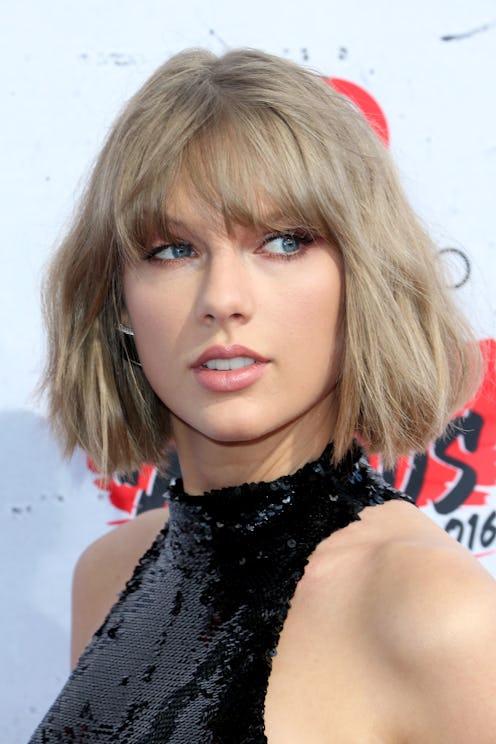Entertainment
The ACLU Just Called Out Taylor Swift’s Lawyer Using Her Own Lyrics

Her new album, Reputation, is already breaking sales records, but Taylor Swift is now part of potential legal battle involving the American Civil Liberties Union. As The Cut reports, Swift's lawyer attempted to get a writer who linked Swift's music to the alt-right to retract and remove her article from the web. On Monday, Nov. 6, the ACLU of Northern California sent a letter to Taylor Swift's lawyer in which they state that her lawyer attempted to intimidate the blogger. In said letter, the ACLU also attempted to be a little cheeky by referencing the lyrics to two of Swift's songs, as well as her new album title. (Bustle has reached out to a rep for Swift for comment, as well as her lawyer, but did not receive an immediate response.)
In an article published on PopFront on Sept. 15, 2017, titled "Swiftly to the alt-right: Taylor subtly gets the lower case kkk in formation," writer Megan Herning wrote at length about the alt-right's embrace of Swift. She examined lyrics and images from Swift's songs and music videos for any similarities to the messages of the alt-right and to Nazi imagery, which she called "uncanny and unsettling." The article also referred to when the alt-right media organization Breitbart tweeted out posts using lyrics to Swift's songs. In addition to commenting on Swift, the article talks at length about Nazism, World War II, and eugenics.
It should be noted that PopFront is not the only outlet to have written about Swift in connection with the alt-right and white supremacists. Publications like Vice have also posted articles on how Swift became a "Nazi idol," and The Daily Best published a piece calling for her to denounce her "neo-nazi admirers."
In their press release, the ACLU links to a letter they say Herning received from Swift's attorney William J. Briggs II, instructing her to remove her post. (Full version here.) Briggs accused the article of being "provably false and defamatory" and demanded that it be taken down from Herning's site and all social media.
Swift has been criticized for not endorsing Hillary Clinton during the 2016 election, though some claim she may have indicated her support for Clinton by her choice of an outfit to vote in. However, as Briggs notes in the letter published by the ACLU, Swift is not obliged to state who she votes for or her political affiliation. Additionally, Briggs asserts that Swift has not remained silent on the issue of white supremacy. "Let this letter stand as a yet another unequivocal denouncement by Ms. Swift of white supremacy and the alt-right," the letter states. In the letter, Briggs points to article by The Huffington Post and the Washington Post that make it clear Swift herself is not a neo-Nazi or white supremacist.
Briggs' letter took issue with four main element's of Herning's post, including a comparison of a scene from Swift's "Look What You Made Me Do" music videos to Hitler. As the ACLU states in their letter to Briggs, "comparisons to Hitler are offensive, but they are not defamatory because they inevitably are opinions." Overall, the ACLU's response is that Herning's article was based on her opinions, which are protected by the First Amendment.
The ALCU also states how Swift's attorney attempted to use copyright law to prevent the letter from being published, according to Matt Cagle, ACLU digital rights attorney.
Notably, in their letter the ACLU references Swift's songs "Shake It Off," "Wildest Dreams," and the title of her album Reputation.
"Criticism is never pleasant," the ACLU's letter to Swift reads. "But a celebrity has to shake it off," the document continued before then making a reference to Swift's newest album, "even if the critique may damage her reputation."
Another part of the letter reads,
"Applying these fundamental constitutional principles to your four 'hideous falsehoods' shows that not even in your wildest dreams can they constitute defamation."
Swift's upcoming new album, Reputation, Target's biggest music pre-sale of all-time, according to the Associated Press, and is set to be released on Nov. 10.
Of the legal situation, Herning stated that she does not intend to back down. "The press should not be bullied by high-paid lawyers or frightened into submission by legal jargon," she said via the ACLU's press release. The ACLU has asked Swift's team to respond by Nov. 13.